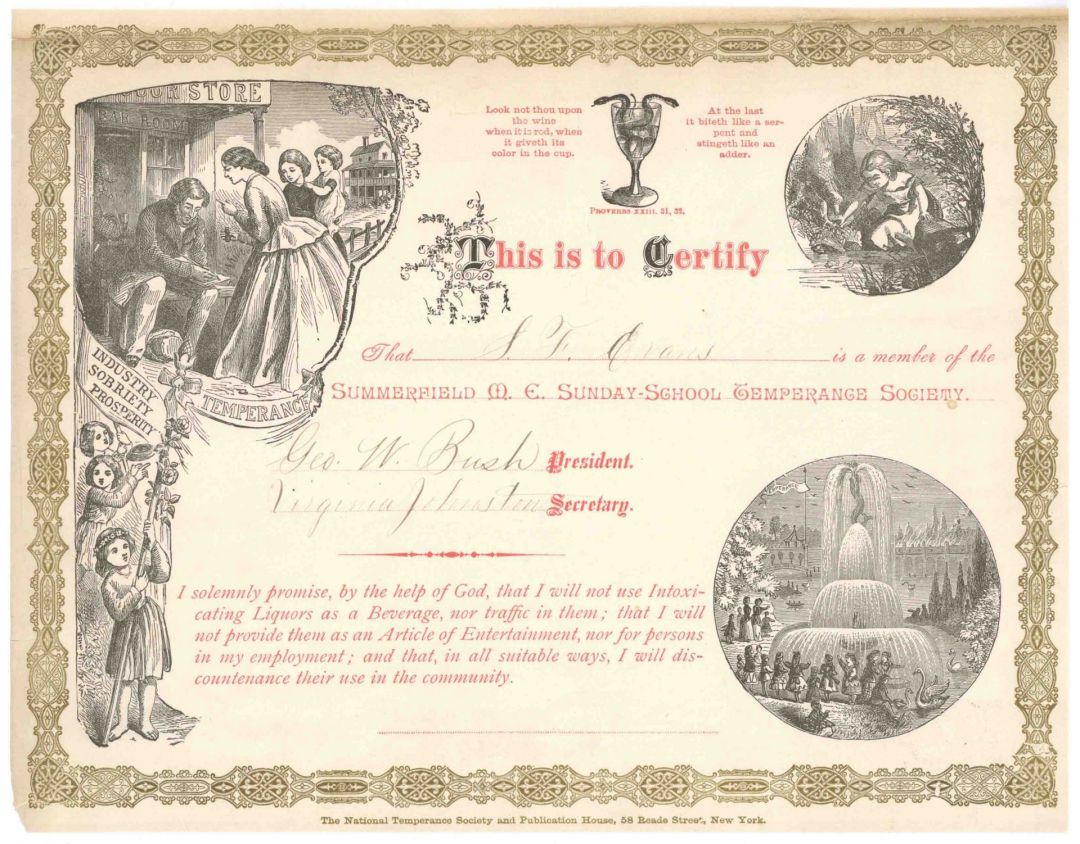Summerfield M. E. Sunday School Temperance Society - Membership Certificate
Inv# AM2021Summerfield M. E. Sunday School Temperance Society. Membership Certificate. Port Chester, New York. Multiple Archival Repairs at back.
The National Temperance Society and Publishing House was a publishing house which advocated personal alcohol temperance and a governmental ban on the personal consumption of alcohol. It was based in New York City.
It was founded in 1865 following a two-day, non-denominational conference of temperance advocates Saratoga Springs, New York. Among its founders were William E. Dodge, Neal Dow and James Black. Dodge was elected president and held the position until his death in 1883.
During its first 60 years, it published over a billion pages of literature in support of the temperance movement. Its three monthly magazines had a combined circulation of about 600,000. They were The National Temperance Advocate for adults, The Youth's Temperance Banner for adolescents, and The Water Lily for children. The Society also published over 2,000 books and pamphlets in addition to textbooks, posters and flyers.
The group's archive is held by the Presbyterian Historical Society in Philadelphia.
Notable people
- James Black (prohibitionist) (1823-1893), American temperance movement activist and a founder of the Prohibition Party.
- Julia Colman (1828–1909), American temperance educator, activist, editor, writer
- George Cruikshank (1792-1878), British caricaturist and book illustrator
- William E. Dodge (1805-1883), American businessman, politician and activist who served as the organization's founding president (1865-1883)
- William E. Dodge Jr. (1832-1903), American copper magnate, activist, and philanthropist. He was the son of William E. Dodge
- Neal Dow, (1804-1897), American temperance advocate and politician
- James J. Spelman (1841-1894), American was a journalist and politician in New York and Mississippi
Ernest Walker Simons (October 11, 1848 – February 1, 1917) was the founder of the Ernest Simons Manufacturing Company of Port Chester, New York, manufacturer of shirts, sheets, and pillowcases.
Simons was born in Ullesthorpe, Wibtoft, Leicestershire, England to James Walker Simons and Jane Ann Loveitt. He was the oldest of eight children. The family emigrated to Connecticut in 1858, eventually settling in Mamaroneck, New York.
Trained as a mechanical engineer, Simons first became involved in the manufacture of various tools and hardware at Riversville, Connecticut. In 1876, Simons joined the firm N.C. Pond & Company in a former shovel factory, making shirts on a small scale. In 1879 a partnership was formed under the name Pond, West & Simons, consisting of N.C. Pond, Marshall O. West, and Simons. In addition to manufacturing shirts, they also sold and repaired sewing machines. They built a two story frame building as their factory, soon adding a third story. After N.C. Pond left the business in 1892, the firm was renamed West & Simons, until the death of West in January of 1902, when it became known as the Ernest Simons Manufacturing Company. During the latter period, a large brick factory was constructed consisting of three buildings with a floor space of 152,000 square feet, employing 800 people. The firm manufactured shirts, sheets, pillow cases, and related items for various American brands such as Fruit of the Loom, Anchor, Whitehorn, and others. During World War I, they were also contracted to produce military clothing. It was one of the largest firms of its type in the country during its operation. Many of his family members were among the board of directors during his leadership. Apart from the shirt factory, Simons was also involved as a Director with the Port Chester First National Bank.
On January 2, 1873, Simons married Anna Willis, daughter of Judge Anson Willis. Together they had four children. Simons was heavily involved as a trustee with the Summerfield M.E. Church in Port Chester. He was a benefactor to the YMCA, the Summerfield M.E. Church, and he also built a mission in India. He was a supporter of the temperance movement, and allowed meetings to be held at the factory. At his funeral, Bishop William F. Anderson of Cincinnati wrote a eulogy in his honor about his devotion to his religion and to charity.











Ebay ID: labarre_galleries